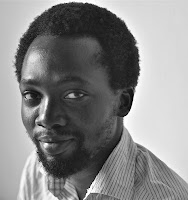While some critics wish that rap will disappear, and some traditionalists bemoan the emergence of spoken word, these two art forms are here to stay and continue to grow with the embrace of the public. When printed, what happens to the facial expressions, nuances and body movements of rap and/or spoken word?
 |
| Timothy Ogene, contributing editor |
Here is an excerpt from
Timothy Ogene’s essay, “On Spoken Word
Poetry: From Stage to Text” from the Second Anniversary 2013 Issue available
at www.aaduna.org
All poems are written to be read aloud or in silence. But some [are] especially written to be performed and acted out. However, when poems appear in an anthology or a collection, they are all subjected to the same reading/interpretation standard, except where a note strictly directs you to pause and perform a particular poem. So you pause, in a train for instance, and perform the poem because the editor said so? No, the poem, like the rest is given an equal silent or the speak-to-yourself-voice reading. In the end, a lot is taken from the poem. Spoken word poetry cannot be wholly replicated in words on paper. The poem itself derives strength from the performance. When the poet/performer decides to explore a new audience via print or online text-based journals, it is therefore, the poet/performer's responsibility to develop a unique style that textually resonates his or her stage performance; it is the poet/performer's responsibility to take advantage of the freedom and improvisation that is at the core of spoken word poetry, and translate it to a coherent textual flow that transports the reader from text to stage.
Read
Ogene’s entire essay. CLICK HERE


Comments
Post a Comment
Please share your comments, thoughts, feedback, or ask questions - thank you!